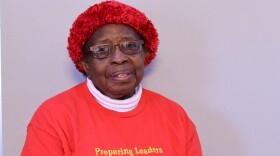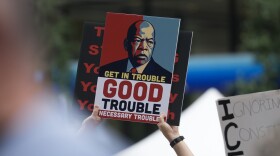-
This week on StoryCorps, Amy Nadal interviews Sadie Moss about her experience on Bloody Sunday and her fight for her voting rights.
-
Facing a sea of state troopers, Charles Mauldin was near the front line of voting rights marchers who strode across the now infamous Edmund Pettus Bridge in Selma, Alabama, on March 7, 1965. The violence that awaited them shocked the nation and galvanized support for the passage of the U.S. Voting Rights Act a few months later. The APR news team covered this year’s sixtieth anniversary of “bloody Sunday.”
-
Protests and events against President Donald Trump's controversial policies that include mass deportations and cuts to Medicaid and other safety nets for poor people have started Thursday at more than 1,600 locations around the country. The “Good Trouble Lives On” national day of action honors the late congressman and civil rights leader John Lewis. The late activist and Congressman was among the voting rights marchers beaten and tear gassed in 1965 as they crossed the Edmund Pettus Bridge in Selma
-
First , there was “bloody Sunday” and “turnaround Tuesday,” then there was a rally in Boston in 1965 over housing discrimination and school segregation. Doctor Martin Luther King, Junior led the protest in Boston as well as Selma. The sixtieth anniversary of this demonstration in the city known as the “cradle of liberty” is expected to draw thousands of people at the same site to honor and reflect on the historic event.
-
Charles Mauldin was near the front of a line of voting rights marchers walking in pairs across the Edmund Pettus Bridge in Selma, Alabama on March 7, 1965. The marchers were protesting white officials' refusal to allow Black Alabamians to register to vote, as well as the killing days earlier of Jimmie Lee Jackson, a minister and voting rights organizer who was shot by a state trooper in nearby Marion. APR listeners heard from marchers as young as fourteen.
-
2025 includes three key anniversaries in the Alabama civil rights movement. This December will mark seventy years since the Montgomery Bus Boycott. 2025 is also the sixtieth anniversary of the shooting of civil rights activist Jimmie Lee Jackson, which led to the March 7th demonstration over the Edmund Pettus bridge that culminated in Bloody Sunday. The city of Selma will remember that day with this weekend’s bridge crossing jubilee.
-
As people get ready to commemorate the 60th anniversary of Bloody Sunday, the Selma to Montgomery March and passage of the Voting Rights Act of 1965, the Montgomery Museum of Fine Arts just opened a show of photographs taken by Spider Martin in those days.
-
A Montgomery-based nonprofit organization that advocates for civil rights and racial equality is inviting the community to honor those who lost their lives in the fight for justice. The Civil Rights Memorial Center will kick off the Selma Bridge Crossing Jubilee Weekend with its annual wreath laying ceremony on March 7, followed by a rally for voting rights protections.
-
An Alabama lawmaker and voting rights advocates are introducing Senate Bill 7, also known as the Alabama Voting Rights Act. The legislation is being billed by supporters as a way to protect democracy and ensure equal access at the ballot box.
-
Dorie Ann Ladner, a longtime fighter for freedom and equality in her home state of Mississippi with contributions to the NAACP, the Student Nonviolent Coordinating Committee (SNCC) and voter registration drives, and a Selma voting rights marcher, has died, her family confirmed.
Play Live Radio
Next Up:
0:00
0:00
Available On Air Stations










